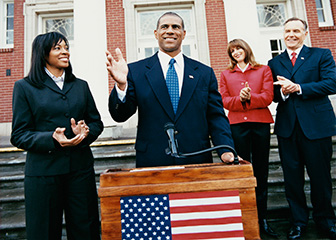
Most legislators must campaign for their positions.
Although most legislative positions have minimum age, residency, and citizenship requirements, there is no established education or training requirement to become a legislator. For most positions, however, candidates need a bachelor’s degree or higher to be competitive in elections. Successful candidates come from a variety of occupations, but many have experience in politics or management positions.
Because legislators are elected, most candidates must campaign for a position. While candidates in some local elections may run unopposed, campaigning for positions in federal, state, and large local governments often requires long hours, persistence, and a significant amount of money. Candidates must, therefore, raise funds, make frequent public appearances, and meet with local voters.
Education
Although there is no educational requirement to become a legislator, most candidates hold a bachelor’s degree or higher. Graduate degrees in law and business are also common, particularly in federal and state offices.
A master’s degree in public administration, including courses such as public financial management and legal issues in public administration, can be helpful.
Work Experience
Work experience is important for legislators. Candidates for legislative office often must demonstrate that they can make good decisions and lead effectively. Many candidates have experience or a strong record of accomplishment working in law, management, business, education, or politics. Some have experience as members of community boards or commissions. Others become well-known for their work with charities, political action groups, political campaigns, or with religious or social organizations.
Many people enter politics on a local level and gain experience there before seeking state office. Many people serve in state legislatures before running for Congress.
Important Qualities
Decision-making skills. Legislators must consider the implications of legislation and decide which positions to support. They must weigh the needs of private citizens, government, and society, and determine which bills to pass.
Interpersonal skills. Legislators use interpersonal skills both to be elected to their position and to be effective at their job. It is important for legislators to build relationships with colleagues, public officials, organization leaders, and the people they represent. They often meet new people and must be able to communicate effectively with others.
Leadership skills. Legislators make the laws that govern our society. Legislators need leadership skills to organize people effectively and enlist others—both colleagues and the people they represent—in support of policies.
Negotiating skills. Legislators often work with people with opposing viewpoints and must find ways to negotiate compromises to accomplish tasks. For example, they may have to be flexible on one issue to gain the support of their colleagues on another issue.
Problem-solving skills. Legislators must assess issues and draft legislation that addresses the needs and problems of the people they represent, government, and society.
Speaking skills. Speaking skills are essential for legislators. They must be able to explain their views when speaking with colleagues and the people they represent. Legislators often give speeches, debate ideas, and attempt to persuade others.








